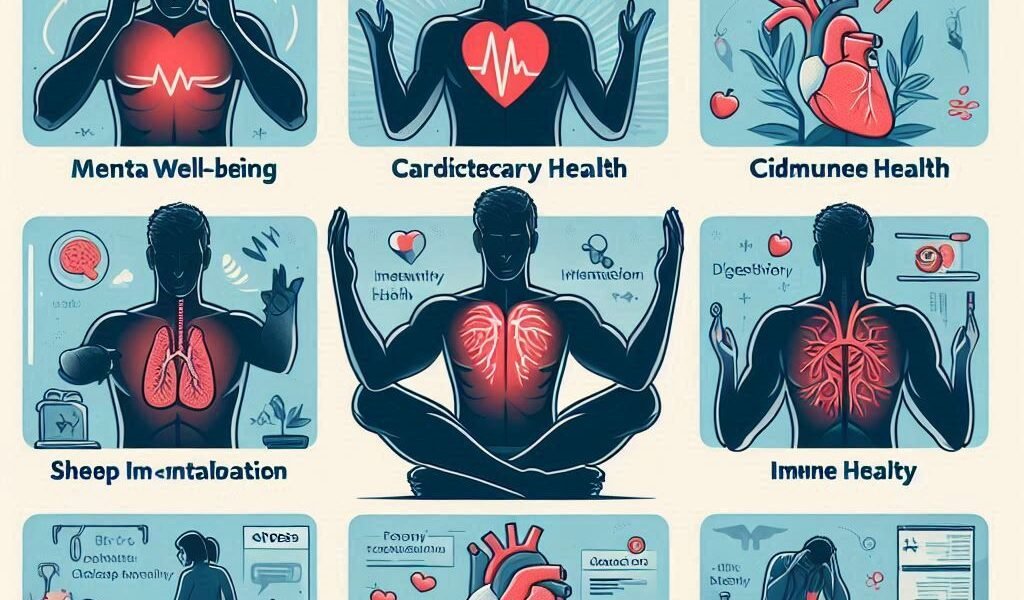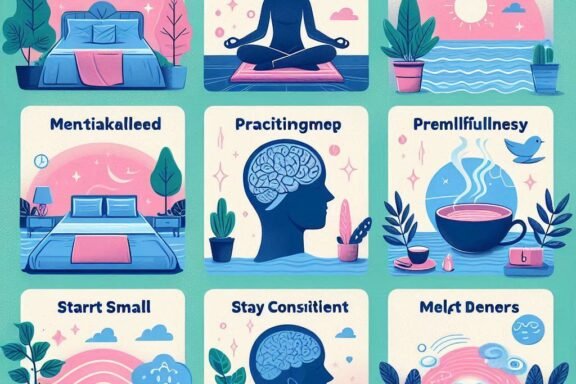Stress is a natural part of life and can even be beneficial in small amounts, pushing us to meet deadlines, stay alert, and overcome challenges. But when stress becomes chronic, it can have serious, hidden effects on your physical, mental, and emotional well-being. The impacts of stress extend beyond mood and energy levels, often affecting various systems in your body and increasing the risk of long-term health issues. In this post, we’ll explore how stress affects different aspects of your health and offer tips on managing it effectively.
1. Impact on the Cardiovascular System
One of the primary ways stress affects the body is through the cardiovascular system. When you’re stressed, your body releases hormones like adrenaline and cortisol, which temporarily increase your heart rate and blood pressure. Over time, chronic stress can put a strain on your heart and blood vessels, increasing the risk of heart disease, hypertension, and stroke.
Long-Term Effects of Stress on Heart Health:
- Higher blood pressure
- Increased risk of artery blockage
- Elevated risk of heart attack or stroke
How to Manage: Incorporate relaxation practices such as meditation, deep breathing exercises, and regular physical activity to help maintain a healthy heart.
2. Weakened Immune System
Stress also has a significant effect on the immune system. When your body is constantly stressed, it produces cortisol in high amounts, which can suppress the immune response. This means that chronic stress can leave you more vulnerable to infections, illnesses, and even slow down the recovery process.
Signs of Immune System Stress:
- Frequent colds or infections
- Slow wound healing
- Increased susceptibility to viruses, like the flu
How to Manage: Prioritize adequate sleep, maintain a balanced diet rich in vitamins and minerals, and practice stress-relief techniques to keep your immune system strong.
3. Digestive Issues
The gut and brain are closely connected through what’s called the “gut-brain axis.” When you’re stressed, it affects your digestive system, leading to issues like indigestion, bloating, and even irritable bowel syndrome (IBS). Stress can also affect your appetite, either increasing or decreasing it, leading to unhealthy eating habits.
Common Digestive Symptoms Linked to Stress:
- Stomach cramps, bloating, or constipation
- Increased symptoms of IBS
- Changes in appetite, leading to overeating or undereating
How to Manage: Eating a balanced diet, staying hydrated, and practicing mindful eating can help support digestion, especially during stressful periods.

4. Mental Health and Emotional Well-being
It’s no surprise that stress has a huge impact on mental health. Chronic stress can lead to anxiety, depression, irritability, and feelings of overwhelm. Stress affects the release of neurotransmitters in the brain, which can impact mood and cognitive functions.
Mental Health Symptoms Related to Stress:
- Increased feelings of anxiety or depression
- Difficulty concentrating or making decisions
- Frequent mood swings or irritability
How to Manage: Regularly practicing mindfulness, connecting with loved ones, and seeking professional support if needed can help maintain emotional balance.
5. Effect on Sleep Quality
Stress can wreak havoc on your sleep patterns. When you’re stressed, your mind often races, making it difficult to fall asleep or stay asleep. Poor sleep quality can create a vicious cycle, as lack of sleep further increases stress levels, leading to a decline in overall health.
Signs of Stress Affecting Sleep:
- Trouble falling or staying asleep
- Poor quality of sleep, leading to fatigue
- Waking up feeling unrefreshed
How to Manage: Create a relaxing bedtime routine, limit screen time before bed, and consider mindfulness or deep breathing exercises to help improve sleep quality.
6. Hormonal Imbalance
Chronic stress can disrupt the balance of hormones in the body, especially cortisol. When cortisol is constantly elevated, it can interfere with other hormones, such as thyroid hormones and reproductive hormones, leading to issues with metabolism, energy levels, and even fertility.
Hormonal Symptoms Related to Stress:
- Fatigue and low energy levels
- Irregular menstrual cycles or fertility issues
- Weight gain, especially around the abdomen
How to Manage: Exercise regularly, eat a nutritious diet, and consider stress-reducing activities like yoga or meditation to help support hormonal balance.
7. Impact on Skin Health
Stress can have a visible impact on your skin. It can trigger or worsen conditions like acne, eczema, and psoriasis. When you’re stressed, your body releases inflammatory chemicals that can lead to breakouts, dryness, and other skin issues.
Skin Symptoms Related to Stress:
- Increased acne or breakouts
- Dry, itchy skin
- Worsening of chronic skin conditions like eczema
How to Manage: Practicing good skincare, staying hydrated, and managing stress levels can help keep your skin healthier and more resilient.
8. Increased Muscle Tension and Pain
Have you ever noticed that your muscles feel tense or sore after a stressful day? Chronic stress can lead to muscle tension, especially in the neck, shoulders, and back. Over time, this tension can cause discomfort and even lead to chronic pain.
Common Physical Symptoms Related to Muscle Tension:
- Tightness or stiffness in the neck and shoulders
- Frequent headaches or migraines
- General aches and pains
How to Manage: Incorporating stretching, regular exercise, and relaxation techniques like massage can help relieve muscle tension and prevent chronic pain.
9. Reduced Libido
High stress levels can affect reproductive health and lower libido. When you’re stressed, your body may produce less of the hormones responsible for sexual desire and reproduction. Over time, chronic stress can lead to decreased interest in intimacy and affect relationships.
Signs of Stress Impacting Libido:
- Reduced interest in intimacy
- Hormonal imbalances affecting reproductive health
How to Manage: Communication with your partner, regular exercise, and addressing stress through relaxation techniques can help improve libido and strengthen relationships.
10. Poor Memory and Cognitive Function
Stress doesn’t just affect your mood—it can also impair memory and cognitive function. Chronic stress leads to the release of high cortisol levels, which can interfere with brain function, making it harder to concentrate, remember things, or make decisions.
Cognitive Symptoms Related to Stress:
- Difficulty focusing or remembering details
- Trouble making decisions or solving problems
- Increased forgetfulness
How to Manage: Incorporate brain-boosting activities, like puzzles or learning a new skill, and consider relaxation practices to help improve focus and cognitive function.
Conclusion
Stress is often seen as a mental or emotional challenge, but it has deep-reaching effects on the entire body. Recognizing the hidden impacts of stress on your health is the first step to managing it effectively. By taking proactive steps to reduce stress—like practicing mindfulness, staying physically active, connecting with loved ones, and establishing a healthy routine—you can improve your overall well-being and protect yourself from the long-term effects of stress. Remember, small changes can make a big difference in managing stress and maintaining a balanced, healthy life.








No Comments